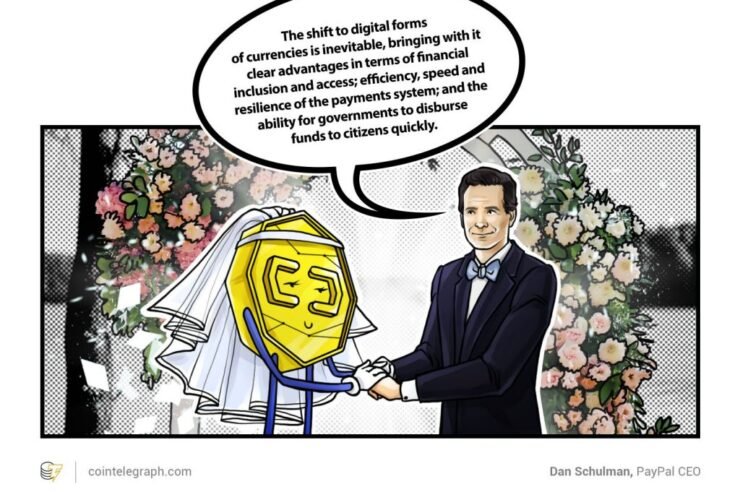Coming every Sunday, Hodler’s Digest will help you track every single important news story that happened this week. The best (and worst) quotes, adoption and regulation highlights, leading coins, predictions and much more — a week on Cointelegraph in one link.
Top Stories This Week
PayPal to offer crypto payments starting in 2021
When rumors started circulating in June that PayPal was planning to launch a crypto service, the fintech giant was tight-lipped.
But this week, PayPal was ready to show its hand, confirming that it will allow its 346 million active accounts to buy and sell cryptocurrencies.
It isn’t an exaggeration to say that this is a huge deal for the mainstream adoption of digital assets. This will introduce large numbers of everyday consumers to crypto for the first time.
Initially, PayPal will support Bitcoin, Ether, Bitcoin Cash and Litecoin. U.S. account owners are going to get this new functionality first, with “select international markets” to follow later.
No fees are going to be charged for conversions until the end of this year. However, merchants won’t be able to support crypto transactions until the first half of 2021.
Announcing the news, PayPal CEO Dan Schulman said digital currencies offer “clear advantages” when it comes to financial inclusion, payment speeds and enabling governments to distribute funds to citizens quickly.
Bitcoin blasts through $13,000 following PayPal’s entrance into crypto
Unsurprisingly, PayPal’s big news served as dynamite for Bitcoin. The world’s biggest cryptocurrency smashed through $13,000 on Wednesday, gaining more than $1,000. That’s only the third time that BTC has hit this level since its record high in 2017.
All of this helps strengthen Bitcoin’s position. Even before the announcement, BTC had enjoyed a sustained period in five-figure territory after spending most of the past three months trading above $10,000.
Mati Greenspan, the founder of Quantum Economics, said the PayPal link was undeniable: “There’s no doubt in my mind that this bit of news is almost solely responsible for today’s extended gains.”
other cryptocurrencies that PayPal’s going to support also enjoyed chunky gains on Wednesday. ETH was up 8%, BCH surged 9%, and LTC rose by a whopping 15%.
And it wasn’t just the crypto industry that was going wild. In the aftermath of the news, PYPL’s share price hit a record high. Unfortunately, the uptick wasn’t enough to prevent Bitcoin’s market cap from overtaking PayPal’s on Thursday.
PayPal rumored to be eyeing acquisition of crypto custodian BitGo
Inevitably, attention now turns to what PayPal’s offering will look like, whether crypto exchanges need to be worried, and the company’s plans for the future.
We’re starting to get an idea of what to expect. PayPal has partnered with Paxos to deliver the service, and it has obtained a conditional cryptocurrency license from the New York State Department of Financial Services.
On Friday, reports from Bloomberg suggested that PayPal is looking to acquire a crypto asset custody firm, adding that the fintech giant is currently in talks with BitGo, which helps investors store digital assets securely.
However, that report added: “Talks could still fall apart and PayPal could opt to buy other targets.”
Meltem Demirors, the chief security officer of the crypto asset manager CoinShares, has predicted that PayPal will seek to launch a stablecoin “in the next six to 12 months.” This would be a sting in the tail for Facebook, given how PayPal left its embattled Libra project.
Not everyone in the crypto industry is thrilled about PayPal’s recent news
Yes, there has been enthusiasm over PayPal’s plans, with the analyst Willy Woo suggesting that the service could easily treble Bitcoin’s user base. But not everyone is cracking open the champagne.
People who buy crypto on PayPal won’t be able to withdraw it to a wallet off the platform, prompting critics to say it’s another case of “not your keys, not your coins.”
SatoshiLabs, the team behind the Trezor hardware wallet, wrote: “If millions of newcomers are onboarded to Bitcoin by PayPal, there could be a very serious information gap that jeopardizes their experience and undermines key principles of cryptocurrency.”
It is also concerned about how PayPal’s clout in electronic payments “will be interpreted as expertise in crypto.”
Given how Satoshi Nakamoto’s vision was to decentralize finance and remove middlemen, some crypto purists will also be horrified at PayPal wading into the space.
But there are other practicalities to worry about — and one of them is tax. Every sale of cryptocurrency becomes a taxable event, especially if it’s sold for more than it was bought for. It’s very possible that the implications of this could be lost on crypto noobs.
And in other news…
Of course, there was plenty of other news in the crypto and blockchain sector this week.
The Chicago Mercantile Exchange quietly overtook BitMEX to become the world’s second-biggest futures market — buoyed by rising institutional demand. All this came as the crypto fund manager Grayscale Investments increased its assets under management by $1 billion in the space of a week.
Data from Messari showed that daily transaction volumes on the Ethereum network are twice those of Bitcoin — putting the blockchain on track to process $1 trillion this year. And in news that’ll make exasperated DeFi users breathe a sigh of relief, a ConsenSys developer predicted that the Ethereum 2.0 beacon chain genesis will happen in the next six to eight weeks.
Speaking of DeFi, the funds locked in protocols surged by $1 billion as analysts predicted we could see a bull run following on from the U.S. election. Meanwhile, the U.S. acting comptroller of the currency predicted that DeFi could render the financial services offered by banks obsolete — just like email disrupted the postal service.
Winners and Losers
At the end of the week, Bitcoin is at $12,994.86, Ether at $409.13 and XRP at $0.25. The total market cap is at $395,014,912,585.
Among the biggest 100 cryptocurrencies, the top three altcoin gainers of the week are Quant (47.26%), Reserve Rights (40.41%) and Ocean Protocol (33.23%). The top three altcoin losers of the week are Crypto.com Coin (18.81%), ABBC Coin (17.74%) and HedgeTrade (16.31%).
For more info on crypto prices, make sure to read Cointelegraph’s market analysis.
Most Memorable Quotations
“There goes wBTC. The majority of wrapped Bitcoin is custodied by BitGo. PayPal is not a good actor in this space. Position accordingly.”
“If millions of newcomers are onboarded to Bitcoin by PayPal, there could be a very serious information gap that jeopardizes their experience and undermines key principles of cryptocurrency.”
“Crypto is about financial freedom. It’s modern money that anyone anywhere can truly control. While we’re excited to see a new audience gain access, a non-custodial approach limits opportunity to self-custody your crypto or transact freely.”
Peter Smith, Blockchain.com CEO
“This is definitely a bullish sign for Bitcoin and other cryptocurrencies. Crypto is all about trust, and PayPal has a very high level of trust with its users […] If the UI/UX of the service is done right, we will see millions of new users join each month.”
Alex Mashinsky, Celsius CEO
“We are eager to work with central banks and regulators around the world to offer our support, and to meaningfully contribute to shaping the role that digital currencies will play in the future of global finance and commerce.”
Dan Schulman, PayPal CEO
Prediction of the Week
Bitcoin price rise to $500,000 is inevitable, Winklevoss twins say
Unsurprisingly, the Winklevoss twins were brimming with enthusiasm in the wake of PayPal’s announcement.
Tyler Winklevoss tweeted: “PayPal is an important bridge between the mainland and the island of crypto. The diaspora from legacy finance is happening and this is the kind of infrastructure that will help make that happen. Soon there will b a flippening and crypto will b the mainland & fiat the island.”
This week, the twins doubled down on their prediction that Bitcoin will eventually hit $500,000, telling podcast host Peter McCormack that it’s a matter of when, not if.
“I would sort of contend that $500,000 Bitcoin is actually pretty conservative and the game hasn’t even really started,” Cameron noted.
FUD of the Week
First ransomware attack in 2020 election hits voting infrastructure in Georgia
A ransomware attack targeting the government systems of Georgia’s Hall County impacted key voting infrastructure, it has been revealed.
“Critical systems” within its networks were affected, and CNN says the incident may be the first ransomware attack in the 2020 election.
Officials said the county’s voter signature database and voting precinct map were heavily impacted by the hack but stressed that the voting process for citizens is unaffected.
Brett Callow, from the cybersecurity firm Emsisoft, told Cointelegraph: “There is a very real risk that they may shake voter confidence in the integrity of the vote, especially as confidence may already be quite low.”
OKEx’s lips remain sealed on its sudden crypto withdrawal freeze
There’s still no sign of OKEx’s cryptocurrency withdrawals returning to normal — nine days after they were suddenly suspended.
The ongoing suspension has been puzzling to many, but the exchange’s representatives maintain that the move was solely because one of the company’s private key holders has been cooperating with a Chinese public security bureau.
OKEx CEO Jay Hao has told Cointelegraph that the company is determined to reinstate withdrawals as soon as possible, adding: “We wholeheartedly apologize for this.”
Some users are starting to warn that their patience is wearing thin, expressing frustration at the lack of transparency surrounding what’s going on.
One tweeted: “Where is your CEO Jay Hao? He has to interact and give updated info frequently. When something happens with Binance, CZ tweets every hour.”
And another wrote: “It’s a bit weird one of the biggest exchanges in the world isn’t letting us withdraw money for so long.”
Filecoin creator denies strike allegations
The creator of the blockchain-based data storage platform Filecoin has dismissed allegations that miners of its token have gone on strike as “nonsense.”
Refuting the claims, Juan Benet claimed on Twitter: “What is happening is that miners are growing slower than before launch. This is in great part because the network is no longer subsidizing their pledge and fee costs — fees cost real money now, and miners need to match growth rate to token flow.”
It had been reported that five of the largest Filecoin miners turned off thousands of rigs to protest the blockchain’s economic model, which means that miners are required to stake FIL as collateral when producing a block. The problem is that many miners are apparently coming up short in the number of tokens needed.
Best Cointelegraph Features
Regulation will keep PayPal’s new crypto services from looking anything like crypto
Cointelegraph’s Kollen Post says that, for now, PayPal’s crypto payments are more about satisfying regulators than providing users with crypto capabilities.
How to build a crypto mining rig in 2020 to earn Bitcoin and Ether
Mining with home rigs is back, so Elena Perez takes a look at what those interested need to know to put together their own rig at home.
Frozen out? Bitcoin price correlation to other assets still undefined
Fidelity’s report claiming Bitcoin is a non-correlated asset has sparked discussion, but as Benjamin Pirus reports, not all agree with the assessment.







Comments (No)